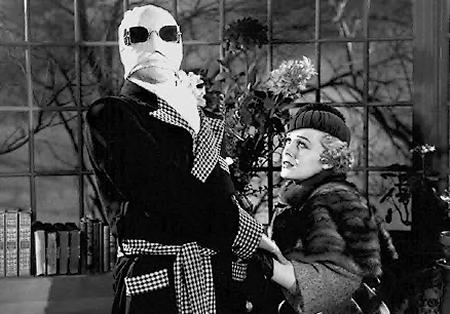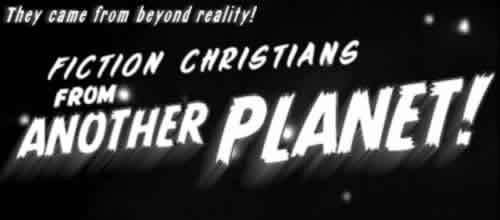Fiction Christians From Another Planet! VIII: The Invisible Body
Why do some Christian novels treat church involvement like going to the bathroom?
Yes, characters “go to the bathroom,” even if we rarely hear of them doing it. But let us face the fact: say, in Tolkien’s Middle-earth, Elves would have had to add a little less beauty to the woods, and Dwarves had to bury something in the earth.
 Why don’t we hear of these moments? Not just from the mild “ew” factor, but because most of the time they serve no purpose in the story.
Why don’t we hear of these moments? Not just from the mild “ew” factor, but because most of the time they serve no purpose in the story.
Ever the efficient storyteller, Scripture, apart from prophetic mentions of bodily waste —records only one “bathroom” incident: in 1 Sam. 24 when King Saul enters a cave to “relieve himself” (verse 3). The story needs this, for David not only spares Saul’s life but avoids assassination at what would have been an awkward moment for the Lord’s anointed.
But based on the contents of some Christian speculative novels — most often, the novels that touch on the real world — authors seem to assume two ways of viewing the Church:
1. “We don’t need to show people going to church or being part of denominations.”
E.g.: Church bodies are “ew.” Instead let’s show rogue Christians (sort of) all by themselves.
This notion was latent in the contemporary/speculative novel I read that inspired this Fiction Christians From Another Planet(!) series. That novel included Christian characters, more or less, of the child-people, blind-faith, living-the-voices-driven-life sort. But Biblically speaking, they were separate from the body; if they had church, it must have been church in a bathroom. Throughout the whole story, which covered weeks, no one mentioned going to church, visiting friends from church, meeting at church, inviting folks to church. Nothing.
In all those phrases I don’t mean mere duty-driven devotion, “religious” in the wrong way. I mean organic desires to organize for Christ — the same way He’s mandated, and the same way fans of anyone or anything else want to find other fans and join a Vast Movement.
Elsewhere in this blog series I noted novels’ issues with megachurchianity. Even that would not be so bad if novels included actual physical megachurches or people being involved in them. Instead such stories only repeat notions culled from megachurch memes. The actual churches are only out there on a spiritual plane, or stuck in a bathroom somewhere.
2. “If we do show church involvement, it’s of an absurdly hyper-idealized variety.”

Never trust any “utopian” society in Star Trek — regardless if flower spores are involved. Even the Federation in later years panicked over neck-scorpions and Dominion shape-shifters.
In this view, evidently the church Body has already been resurrected and doesn’t have any sickness or suffering or even human waste products. (By the way, that last may actually not be true of resurrected bodies; after all, before sin, did Adam and Eve “go to the bathroom”?)
We’ve all seen these in non-speculative Christian fiction that shows the general Church and particular local churches as pretty much utopian, where everyone floats about and smiles and lives in harmony and cares for others — and certainly has nothing to hide whenever the new Federation delegation beams down. But speculative storytellers aren’t immune to this wrong kind of “fantasy” either, especially if their stories touch the real world. Here I’m thinking of the Left Behind series, soon to start a new micro-series on SF, which include no other denominations or different end-times views, only a clear division: good guys (some readers assume dispensational pre-millers) raptured, bad guys (liberals, etc.) left behind.
3. A praise: high fantasy novels may include better Church parallels.
We read of no First Temples of Aslan or hobbit-hole fellowships (ha!) intended to study the truth myths of Ilúvatar. But any time a fantasy novel explores a good kingdom, a questing fellowship, or any group of people bound by a common purpose beyond themselves, that is like the Church — the Church that C.S. Lewis’s demon Screwtape described as “spread out through all time and space and rooted in eternity, terrible as an army with banners.”
Quite a spectacle, founded by Christ Himself: a capital-C “invisible” Church of lowercase-C visible churches, “organized” around the Savior, teaching, fellowship, and His sacraments.
So why do some stories fear showing local churches? Here are a few possibilities.
1. Local churches are scary.
Screwtape described the Church as “terrible,” an entity that “makes our boldest tempters uneasy.” Yet Lewis as the demon’s author might have similarly quivered. At least for a while he was no fan of his local church, and many Christians now feel the same way about theirs.
Rebuttal: Having real grievances about churches’ abuses or other sins is different from the evangelical cottage criticize-church industry. For example, George Barna found a house-church advocate named Frank Viola and together they (re-)published a book about how almost everything in your local church-that-meets-in-a-building is wrong. Meanwhile Brian McLaren and other liberal “evangelicals” attack the broader Church from other angles.1
2. Local churches are messy.
If Christian post-dystopian action-heroine Jane Jubilee is on the run from atheist assassins, life is messy enough without also worrying about her underground Baptist church’s latest squabble over possibly switching to sprinkling instead of immersion. So authors cut the fat.
Rebuttal: Real Christians go to church. It’s what we do. Even this heroine could be shown missing her church friends and teaching while dodging evil atheists’ attacks. And certainly realistic local-church issues could come into play even in such a setting. How may the same baptism debate go when almost all the world’s waterways are polluted? Or how would this Christian group debate carrying weapons in light of Jesus’s warning to Peter in Matt. 26:52?
3. Novels focus on non-Christians anyway (or their fantasy equivalents)
This I partly covered in part 1: too many novels forego the challenge of following a strong Christian character, who would surely want to be a church member, in favor of following yet another (likely megachurch-clichéd or straw-man) nonbeliever. This gets boring.
Rebuttal: Strong Christians are very interesting people with fantastic stories. It’s a tragic cheat that many novels, including speculative ones, prefer exploring pre-converted pagans.
Solutions and series conclusion
 Much of this could be avoided if people would, as a social-network friend simply suggested, just read the Bible, people. Scripture — especially the books authored by the Apostle Paul — loves the Church and churches yet also reflects and criticizes them honestly. So should our stories. That’s why I as a reader will seek and enjoy and positively review Christian novels endorse the beauty, presently flawed but future-perfect, of Christ’s Bride. And we can only do this in cooperation with other local-church members, as we enjoy stories together.
Much of this could be avoided if people would, as a social-network friend simply suggested, just read the Bible, people. Scripture — especially the books authored by the Apostle Paul — loves the Church and churches yet also reflects and criticizes them honestly. So should our stories. That’s why I as a reader will seek and enjoy and positively review Christian novels endorse the beauty, presently flawed but future-perfect, of Christ’s Bride. And we can only do this in cooperation with other local-church members, as we enjoy stories together.
Which leads to a brief response to one series commentator: That’s why I wrote this series. It’s not to rant about or spank fiction authors. It’s to exhort readers to identify fiction aliens like this, perhaps by this series’s whimsical retro-sci-fi-esque names. As more readers point these out and gently criticize, gradually more authors will respond to reader desires. And the imagination, realism, and writing quality of Christian speculative novels may improve.
THE END (?)
- For a sensitive and yet more-Scriptural view of the Church and its member local churches, I highly recommend Rev. Kevin DeYoung’s and (Speculative Faith contributor) Ted Kluck’s nonfiction book Why We Love the Church: In Praise of Institutions and Organized Religion. ↩











































Also, Eglon king of Moab’s servants thought he was in the bathroom (Judges 3:12-30).
Oh, sorry, that wasn’t really the point of this post, was it…
Have you read “An Alien at St Wilfred’s” by Adrian Plass? A great deal of it happens within a church building, and a lot of it is about a vicar’s struggle with certain members of his congregation. The main characters are a group of very different friends who probably would never have met if they hadn’t belonged to the same church. The church has a real denomination too (Church of England). And there are all sorts of differences of views, anger against God, dodgy theology… basically very imperfect Christians.
Shoot, and here I was going to bring up Eglon. Oh well. 😉
Ah, Eglon, I’ve always loved that story (in the same morbid way I enjoy original Grimm’s fairy tales).
There’s also Elijah’s crude little joke when he’s challenging the prophets of Baal, “Perhaps he pursueth ….”
Hehe, me too. We just heard an absolutely fabulous sermon on that text last Sunday!
Re toilets in heaven – did Adam & Eve not have merely physical bodies, whereas we’ll have spiritual ones?
“Spiritual bodies,” not meaning “spiritoids,” but Spirit-powered resurrected physical bodies. See Fiction Christians from Another Planet! VII: Attack of the Spiritoids.
Yes. But spiritual bodies seem to have some different rules. So Jesus had flesh and bones and could eat – but he also could appear and disappear. So they are not the same. In what ways they are the same/different, though, we don’t know.
I think the whole “church” argument only works if the speculative fiction is set in a world similar to ours. Setting an American Megachurch on Alpha Centauri would feel weird and wrong. (Now, a group of believers on Alpha Centauri with their own worship customs would be pretty cool. Especially if they were contending with the threats offered from the game of the same name.)
Or, if a person is writing about Elves, do they really need to meet in a church building? Do they need to gather together at all? (Tolkein’s elves were telepathic.)
Only Christian fantasy tries to shoehorn weird American church conventions into their works (and admittedly, compared to churches elsewhere in time and space, American churches are pretty shallow). Other fantasy has temples to their various gods, good and bad, cultists, priests, high priests (usually bad), and various other representatives. (The oddball Catholicism in Lady Hawk comes to mind.)
IMO, if the story has Jesus, then it has to have a body of believers that worship in some way. If it doesn’t have Jesus, don’t push the church experience.
(Which reminds me of a discussion I had with some friends of mine years ago. We’d all enjoyed the first Matrix movie and were speculating about following movies. The idea was that if Neo was Jesus, then the next movies needed to be Acts, and follow Neo’s followers and the powers they all got as they learned to fight the Matrix. And then the sequels came out, and we never spoke of this again.)
I agree — thus this episode is more specific to speculative stories set on this world, past, present, or future. Any fantasy that includes a fellowship, group of knights, overall-good kingdom, Mages of the Forces of Light™, whatever, reflects the Church. That’s the case even if there’s no direct incarnate Jesus-equivalent in the story.
Hmm, Chris Walley almost does that in his Lamb Among the Stars sci-fi series.
I need to reread Lamb Among the Stars. I remember the plot-twist ending to the first one, but I think they’ve been recombined since then. The odd thing is, in the past year or so, I’ve been noticing more and more how problems in the church can be ignored for a time, but then…there’s some personal stuff going on now too, but part of me resisted recognizing what was going on…
If you never finished the series, Galadriel, I highly recommend you do. Walley deals very strong with the idea of differences amongst believers and the church taking up its purpose as the body of Christ (while also venturing into extra-dimensional space/time planes and fighting absolute evil). It’s a great series that deserves more press than it currently receives.
I think a church business meeting on Alpha Centauri sounds like great fodder for a story. Let’s hear it!
A group of believers with worship customs would be a church. Doesn’t have to resemble our kind.
No – because humans don’t either!
That’s an interesting question. Theretically we could all Skype each other and not meet face to face. But would that be the same? Hmmmm…
I am sometimes under the impression that some spec fic writers view the entire populace of their story’s universe as part of the “church.” In more of a universal (i.e. catholic) way than I tend to think, at least. I don’t think that excuses the writer from his/her exclusion of the congregation, but that seems to be part of the reasoning.
On the flip side of the megachurch/evangelical mainstream notion, Donita K. Paul almost suggests an underground church in her Dragon Keeper Chronicles. Belief is widespread and favors mentor/disciple relationships, but again avoids organized groups.
It seems almost the same in The Blood of Kings trilogy by Williamson. (I haven’t read Dragon Keeper Chronicles.) For me, in The Blood of Kings, this approach felt too modern and created a disconnect with the story world. There were essentially modern-day, somewhat Pentacostalish home-church congregations meeting in a medieval fantasy land that also has ancient temples to both God and false gods. I wonder if this was done in order to insert the fellowship experience of the Evangelical audience into the story, or whether it is supposed to show that the true Church is always a neglected minority, whatever religion the country may adhere to.
Thanks for this series, Stephen, and especially thanks for this post. I have said elsewhere that this “church? what’s a church?” phenomen is a bet peeve of mine. Equally bad are the churches that a character only visits once to receive some important spiritual mentoring that gives the vital clue necessary to Save the World.
Especially in light of the recent brouhaha over a certain “edgy” MLP (er, Hinterlands) novel, I’d like to make this point: why, if all characters are duty bound to honor Commandments #3 & #7, do even our most righteous characters get a pass when it comes to #4? It’s very frustrating because I believe it plays into the whole “turn to Christ and all problems are over” myth, or the equally dangerous us versus them idea that our only problems lie outside of us/the body of believers. The early church is heavily romanticized as near perfect, yet we have many instances of decisiveness and doctrinal/theological issues arising within this group. After all, who do people think Paul was talking to when he wrote things like “You foolish Galatians! Who has bewitched you?”
While imperfect, I loved Karen Hancock’s novels precisely because they dealt firmly and squarely with the idea of having to deal with fellow believers. Her main characters grow stronger for studying God’s word together rather than go it alone: in fact, when her characters do try to do the whole macho Hero loner thing, they often go horribly wrong. Spiritual instruction and accountability is crucial in their struggle.
We need that lesson taught now more than ever. Church is supposed to make us stronger, and if it’s not, guess who might be part of the problem? It is your job as a Christian to be part of a body of believers and to encourage, strengthen, and (yes) bring accountability to each other.
Deuteronomy 23:12-14 gives instructions on disposal of excrement.
Stephen, you’ve thoughtfully pointed out a few unworthy reasons that Christian spec-fic authors and/or readers tend to eschew The Local Church. But I think the issue’s more complex than you make it out to be. I can think of several perfectly legitimate reasons for church life to take a backseat in Christian sci-fi and fantasy.
1.) Local church life is typically pretty boring. By “boring” I don’t mean that it’s easy, uneventful, or unimportant, but rather that it’s not nearly so intrinsically exciting as, say, a desperate quest into the wild unknown. Healthy church life requires geographic constancy, diligence in the face of tedium, and regularly-scheduled pastoral instruction, none of which are particularly enticing to a reader of sci-fi or fantasy. Escapism is, let’s face it, a major component of spec-fic’s allure. We readers want to transcend the drudgery of the everyday, not relive it in alien trappings.
2.) Churches have too many people. Part of the point of the local church is to enable Christians to become part of a community, no? Christ’s Body ceases to function when its members strike out on their own. But what this means for writers is that, if they want to showcase a local church, they’ll have to work with an ensemble cast. This can prove quite difficult to pull off, especially for inexperienced writers. I know I still don’t feel comfortable introducing more than four viewpoint characters into a single story. So instead, what typically takes the place of this unwieldily group is the “fellowship”: that elite band of unlikely heroes who set aside their petty differences and personal animosities in service of a common cause and who, after they’ve defied tyranny, explored the unknown, or saved the kingdom from destruction, find that they’ve discovered in each other friends who stick closer than brothers. If that’s not “church,” albeit in a concentrated dosage, then I don’t know what is.
3.) Denominational specificity narrows one’s target audience. If I, as a baptist, pick up a book that grapples mightily with the issues of, say, transubstantiation or Holy Spirit baptism, I’m unlikely to find myself engaged in the story’s thematic arc unless those issues are so allegorized as to be neigh unrecognizable. Why? Because in choosing my denominational affiliation I’ve already decided where I stand in regard to those kinds of “secondary” theological controversies. Also, those issues simply aren’t important enough to warrant efforts at proselytization. If a Catholic or a charismatic or an adherent of Eastern Orthodoxy believes the Gospel and has an authentic relationship with Christ, who am I to imply that’s somehow insufficient? We can debate the issues in person, sure — but as a writer I’m not gonna deliberately dredge up nonessential theological quandaries in my fantasy novel. “Christian speculative fiction” is already severely self-limiting in terms of audience spread; “baptist speculative fiction” would be downright boutique.
4.) The strange and threatening, rather than the familiar and comforting, is the stuff of sci-fi and fantasy. The Hero’s Journey, by definition, requires the protagonist to depart the Ordinary World. As readers we know this instinctively, and so does Scripture. While I’ll admit the deaths of Ananias and Sapphira constitute high drama in a local-church setting, the New Testament’s historical books pay scant attention to ordinary First Century church life, opting instead to recount the exploits of the Apostles. The Apostles, who lead lives of adventure, peril, deprivation, and uncertainty. Who belonged to no local church, yet established many. They were the kind of men who naturally lend themselves to the storyteller’s art, and so Scripture quite naturally focuses on them. This doesn’t mean the day-to-day struggles of those churches they planted weren’t important; it just means they weren’t quite as interesting. And interesting-ness isn’t unimportant.
None of this is meant to imply that The Local Church doesn’t belong in speculative fiction. It’s been done, and done with flair: by Peretti in The Visitation, by Dekker in White, and undoubtedly by others. I’m just pointing out some of the likely reasons it’s an uncommon sight.
A few thoughts:
For Paul’s first missionary journey he was sent out by the church in Antioch, and returned back and reported to them everything that happened. So too missionaries today doing the ‘exciting’ stuff will usually have a church behind them (certainly in my own tradition missionaries are often sent out from the local church, with no other sending mission organisation). A book could have a church-type-thing in the background without being set in the church.
You don’t need the whole church to be characters in a book. Look at Harry Potter – that’s a school story, but most people in the school are not main characters.
I agree that focussing on denominational issues could be a bit off-putting to those who are from different denominations. Saying that, there are issues that affect all churches, like personality clashes, people from different cultures or backgrounds, hypocrisy, and people not keeping the cupboards tidy. grrr >:-( OK, maybe you might not write a book about that…
Agreed. Church-in-the-background is what I’d advocate, rather than the extreme view in many Christian-contemporary-speculative novels of ignoring church entirely.